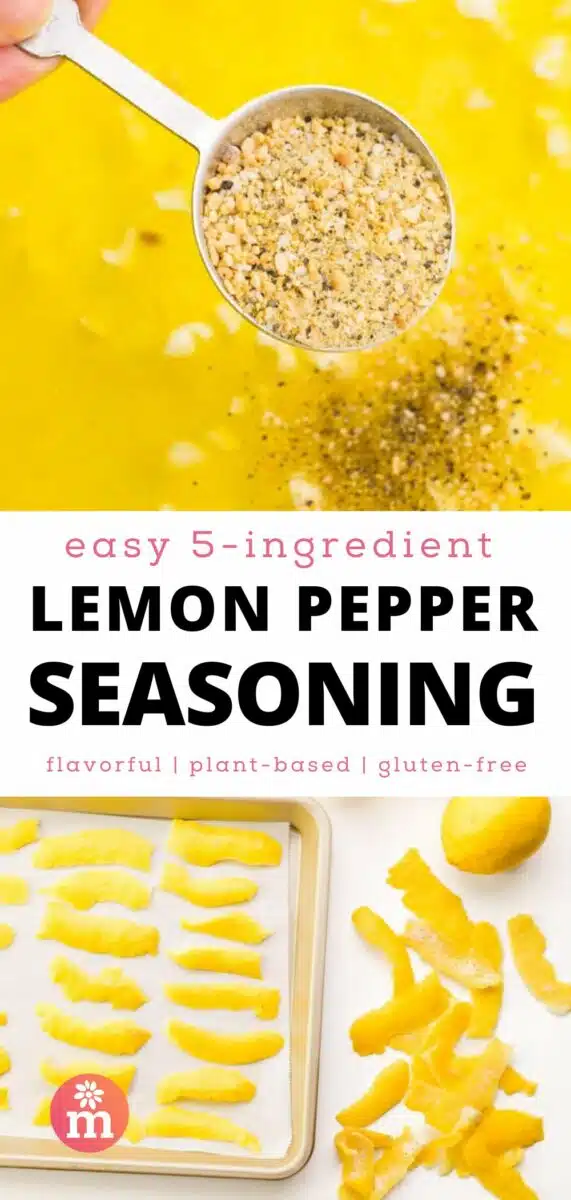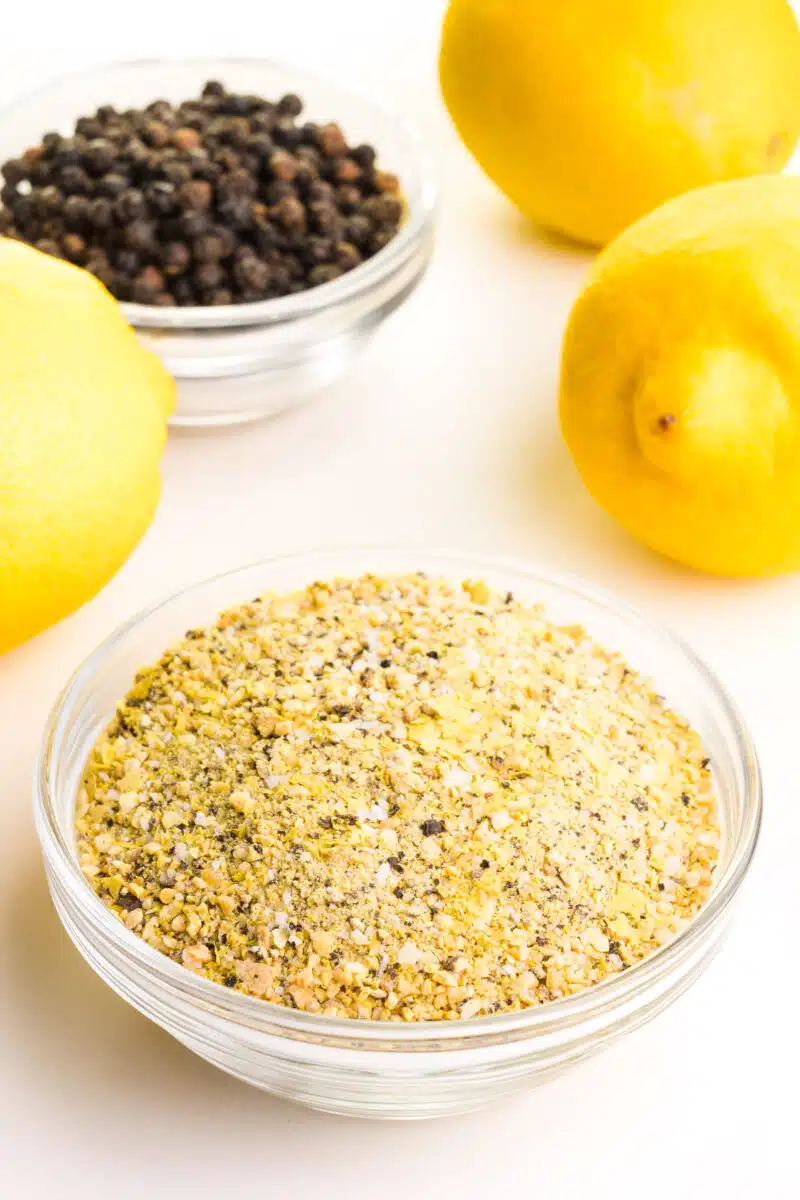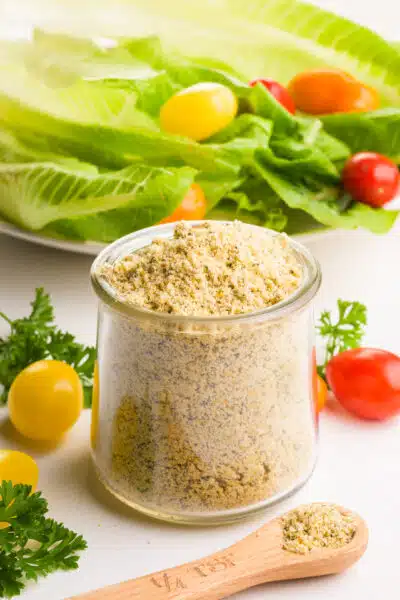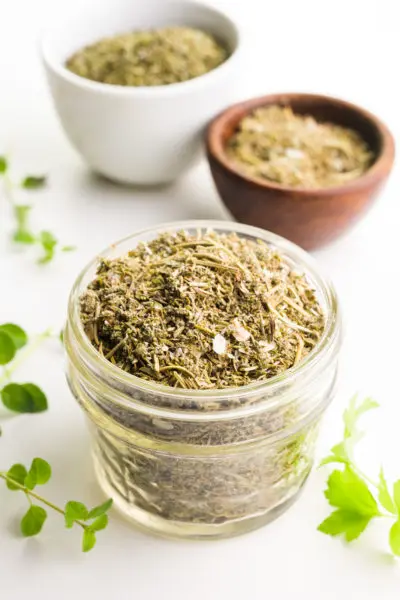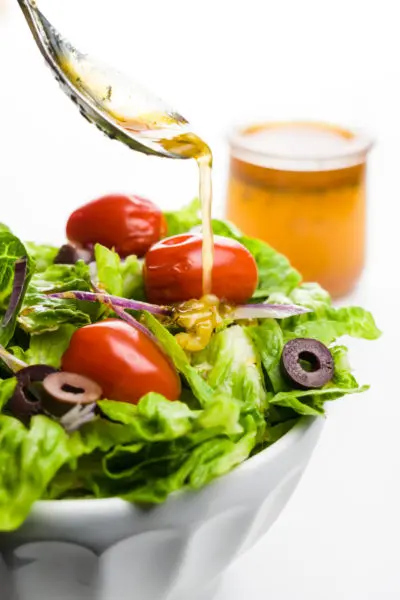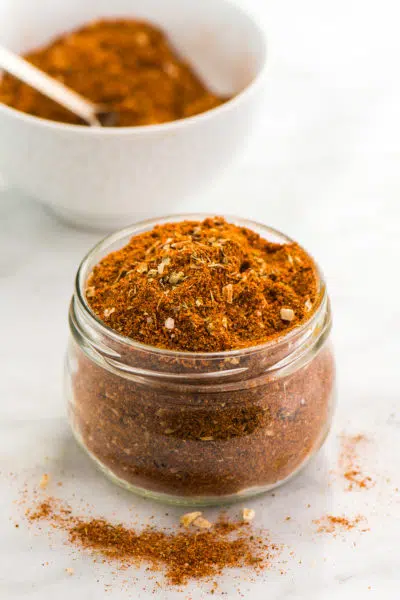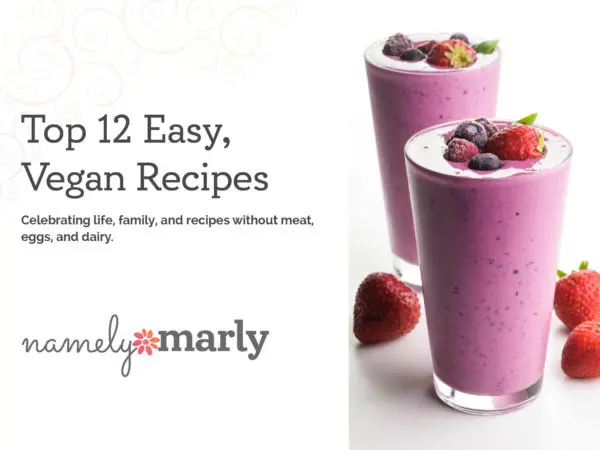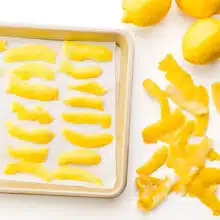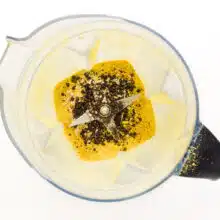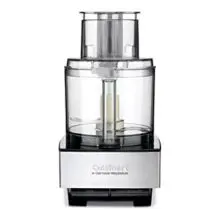Lemon Pepper Seasoning
Lemon pepper seasoning is a versatile blend of herbs and spices that can be used to flavor a variety of dishes. Made with lemon zest, black pepper, salt, and garlic powder, this is an easy addition to your kitchen pantry. There are many variations of lemon pepper seasoning, and you can adjust the ingredients to suit your taste.
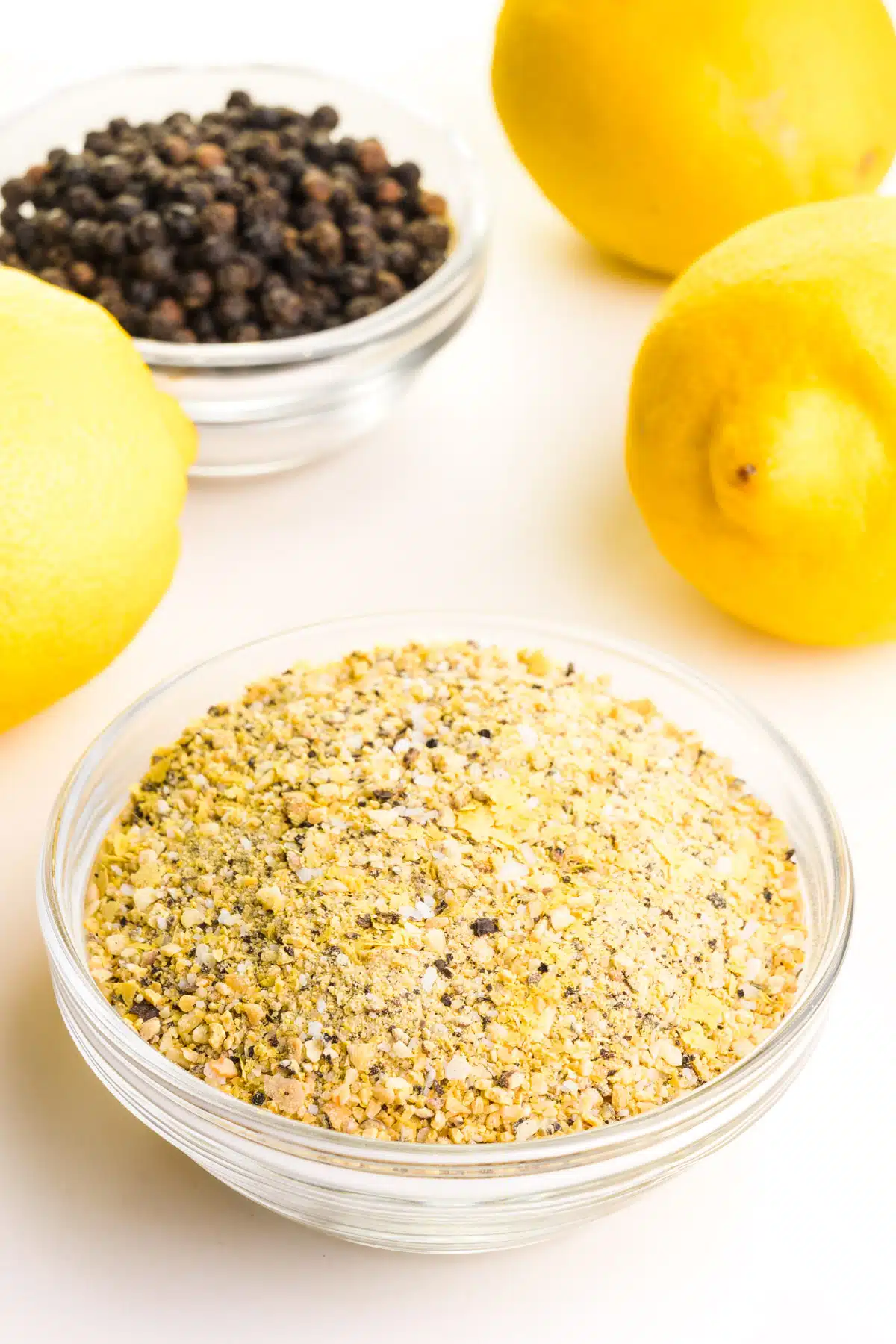
Making your own lemon pepper seasoning is easy and affordable. It is also a great way to control the salt and other ingredients in your food. I think you’ll love this simple recipe for homemade lemon pepper seasoning. I love using it in recipes such as this lemon pepper baked tofu.
See below for ways you can use it in your favorite recipes.
Key Ingredients
Looking for the best lemon pepper seasoning ingredients? These are my go-to favorites. See the recipe card below for specific quantities:
- Fresh lemons — We’ll use fresh lemons to create homemade lemon zest for the best flavor. You can use store-bought lemon zest, but it’s not as favorable.
- Peppercorns — You’ll want to use whole peppercorns to deliver the extra kick of fantastic flavor and spice.
- Dehydrated onion — To make sure we get bits of coarsely ground onion bits, dehydrated onions are the way to go.
- Granulated garlic — It’s easy to find granulated garlic in the spices section of most grocery stores.
- Flaky sea salt — We want bigger granules of sea salt in the seasoning, and flaky sea salt is the way to go. If you prefer salt-free lemon pepper seasoning, leave this ingredient out or substitute No-Salt products (found in the spices section).
What to do if you don’t have time to dehydrate lemons? Here’s how to make lemon pepper seasoning with lemon juice. Substitute the juice of a fresh lemon and add some cracked pepper, garlic powder, and salt. This combination makes a fast alternative!
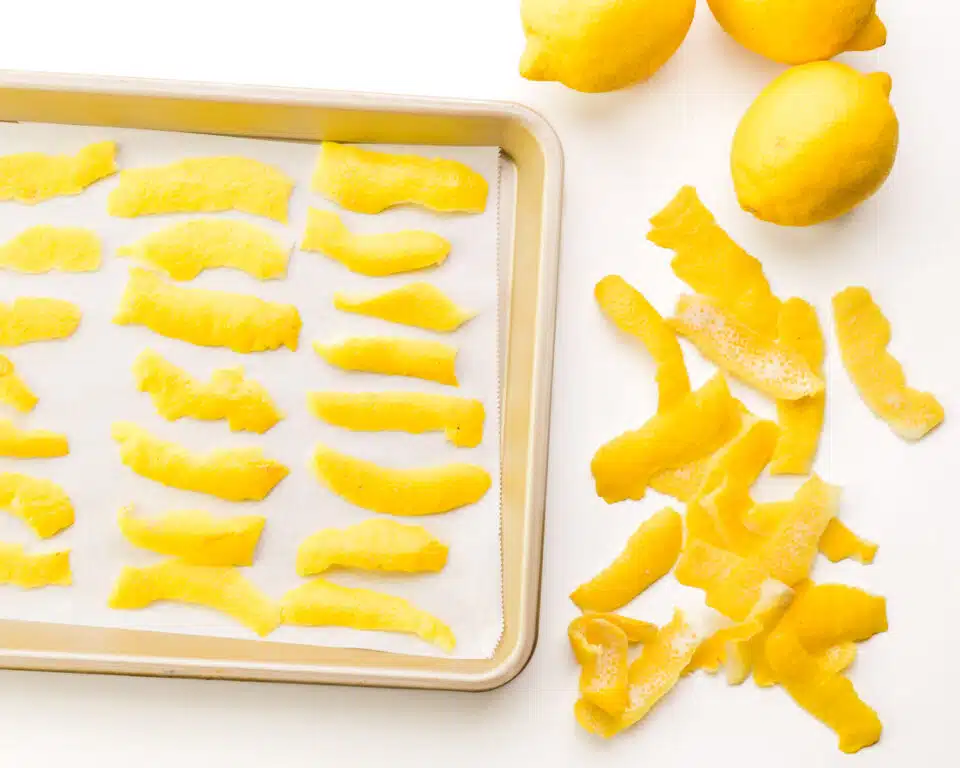
How to Make Lemon Pepper Seasoning
- Remove the skins from several lemons.
- Place lemon skins on a pan and bake until dried.
- Add lemon zest and remaining ingredients to a high-speed blender and pulse until you achieve a sand-like consistency.
What Makes This Recipe Shine?
- FLAVORFUL — This homemade seasoning is more flavorful than store-bought varieties.
- EASY — Slow=baking the lemon skins is so easy to do!
- MAGIC — This seasoning blend is magical when added to your favorite savory dishes. It’s even good drizzled over popcorn!
Frequently-Asked Questions
What does lemon pepper seasoning have in it?
This zesty seasoning is made with a combination of dried lemon zest, garlic granules, black pepper, and flaky sea salt.
Is lemon pepper seasoning vegan?
Yes, lemon garlic pepper seasoning is made entirely with plant-based ingredients and is therefore vegan. You should always check labels.
Does lemon pepper seasoning go bad?
The zesty flavor from the lemons will degrade over time, and therefore the seasoning blend can lose its potency. Try to use it within the first six months for the best return on flavor.
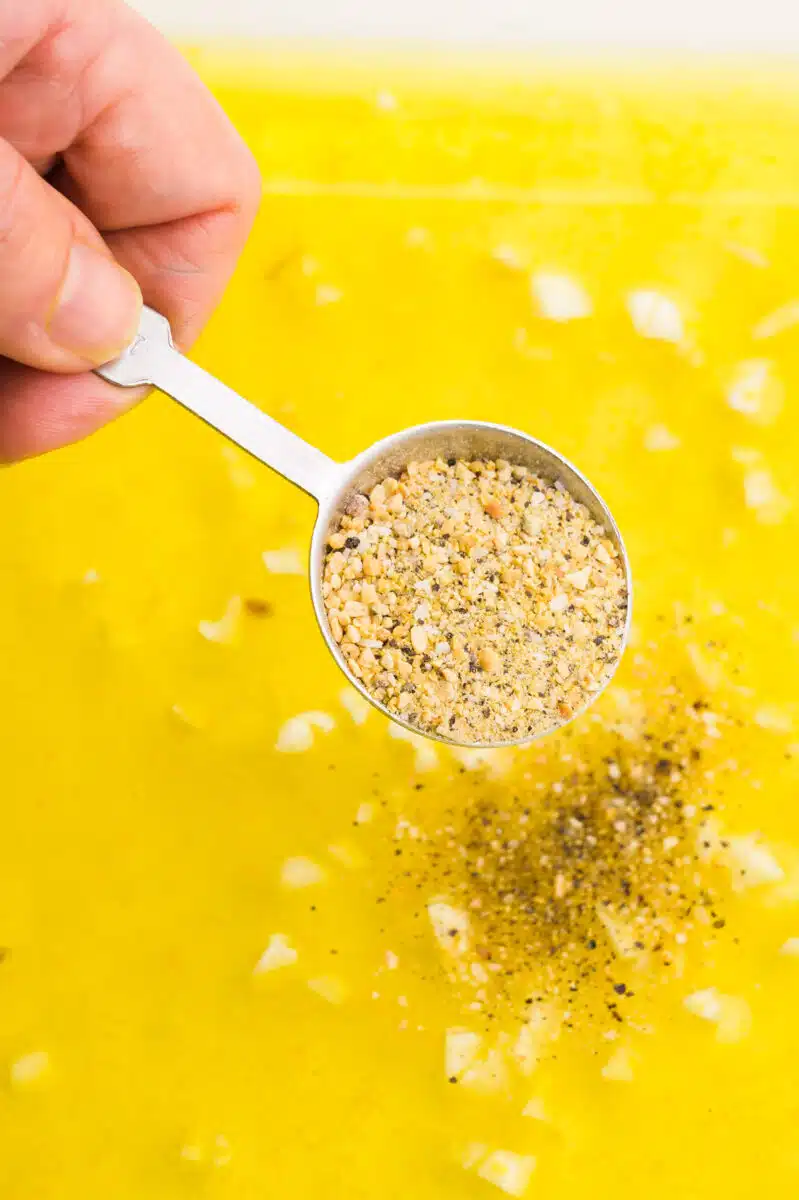
Savory Lemon Seasoning Benefits
Here are some of the benefits of using lemon pepper seasoning:
- This seasoning is a delicious and versatile blend of lemon, garlic, and pepper.
- It is perfect for your favorite dishes, such as roasted vegetables, tofu, and more.
- Add flavor to your favorite dishes without adding calories or fat.
- It is a healthy and affordable way to add flavor to your meals.
If you are looking for a delicious and versatile way to flavor your food, then lemon pepper seasoning is the perfect choice for you.
Lemon Pepper Seasoning Uses
Lemon pepper seasoning can be used to flavor a variety of dishes, such as:
- Vegetables — Oven Roasted Veggies taste even better with this seasoning on top.
- Salads — The fresh lemon flavor comes through when sprinkled over your favorite salads.
- Pasta — Add lemon flavor to your plant-based fettuccini alfredo with a sprinkle or two of this seasoning.
- Rice — Make your whole grain rice even better with chopped herbs and lemon zest seasoning.
- Soups — Serving some plant-based minestrone? Add this seasoning right before serving for the best flavor!
- Sandwiches — Give your next sandwich some zest with this tasty seasoning.
- Tofu Marinade — Add lemon seasoning to oil, soy sauce, vinegar, and tofu cubes. Cover and let this sit for 30 minutes to several hours. Then bake, and you’re ready to serve.
It can also be used as a dry rub or marinade. To use lemon pepper seasoning as a dry rub, simply sprinkle it over the food before cooking.
Storage Tips
Store this seasoning in a lidded jar for up to 6 months. The flavor is best within the first month or two after making it. After six months, the flavor will begin to diminish.
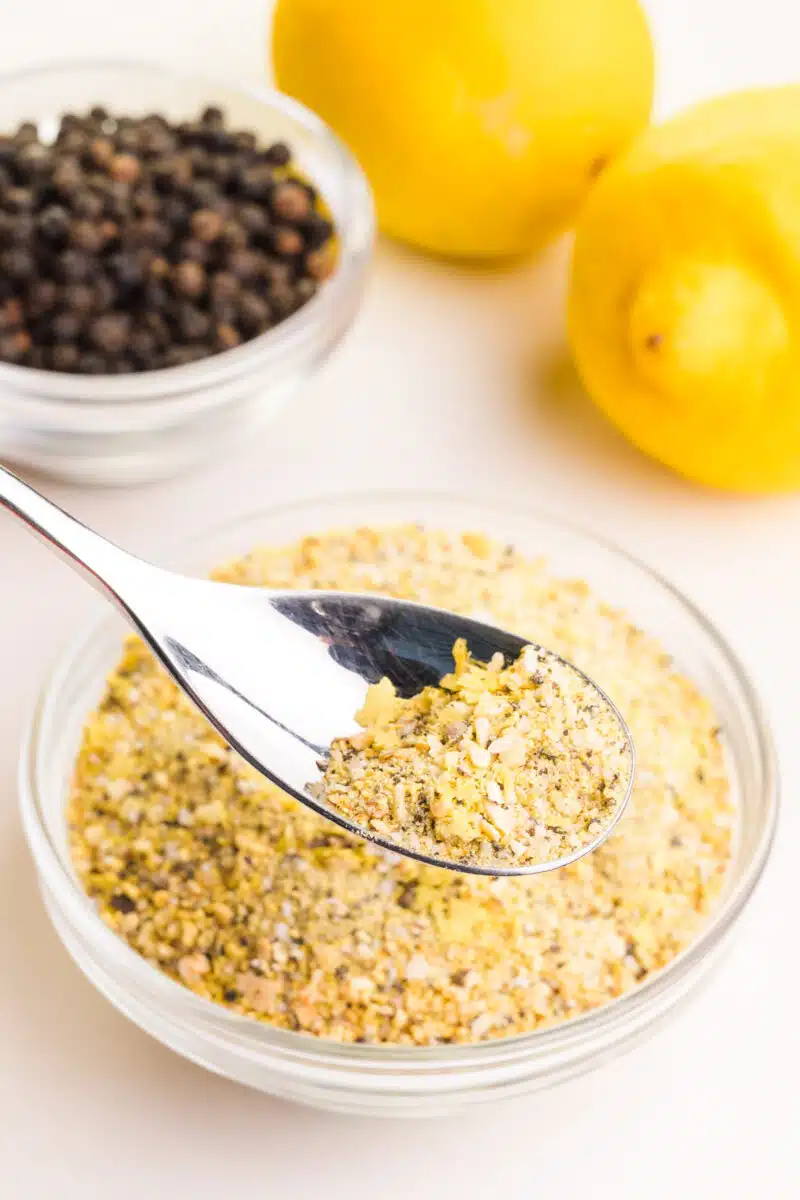
More Vegan Seasonings & Sauces
If you love this lemon pepper seasoning recipe, here are some more seasonings and sauces to try:
Lemon pepper seasoning is a delicious and versatile way to add flavor to your food. It is easy to make and store, and it can be used to flavor a variety of dishes.
So next time you are looking for a way to add some zest to your food, reach for some homemade lemon pepper seasoning.
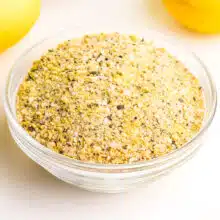
Lemon Pepper Garlic Seasoning
Ingredients
- 10 lemons
- 2 tablespoons peppercorns
- 2 tablespoons dehydrated onions (see notes)
- 1 teaspoon flaky sea salt
- 1 teaspoon granulated garlic
Instructions
- Preheat oven to 200°F/93°C. Line a baking pan with parchment paper.
- Wash lemons and then cut off both ends of the lemons. Use a vegetable peeler to remove the peel in strips. Try to get only the skin and not too much of the white pith that's below the skin. See notes for ideas on what to do with the lemons after removing the peel.
- Lay the peels on the prepared pan in a single layer. Bake for 45 minutes. The lemon strips will begin to curl up on the ends. The most important thing is that they should be dried out. If you can't tear them apart with your hands, it will be hard to pulverize them in the blender. So, bake them until they are dried.
- Remove the lemon peels from the oven, and allow them to cool for 5 minutes. Transfer cooled lemon peels to a food processor and pulse in short bursts to break them down. Then process for up to 1 minute, until a coarse sand-like texture is achieved.
- Add remaining ingredients and pulse in short bursts until everything is broken down.
- Transfer to a lidded container and store in a dry dark place for up to 6 months. The flavor profile diminishes after this time so you'll want to make a fresh batch.
Recommended Equipment
(The products above contain sponsored links to products we use and recommend)
Notes
- You can use them to make a tasty lemon smoothie.
- Peel off the pith and tear the lemons into pieces (like an orange) and freeze the lemon pieces to add to glasses of water later.
- Juice the lemons and freeze the juice in ice cube trays. Then transfer frozen lemon juice cubes to a freezer bag. Add lemon ice cubes to recipes, smoothies, or to make infused water.
The nutrition information shown is an estimate provided by an online nutrition calculator and should not be considered a substitute for a professional nutritionist’s advice.
